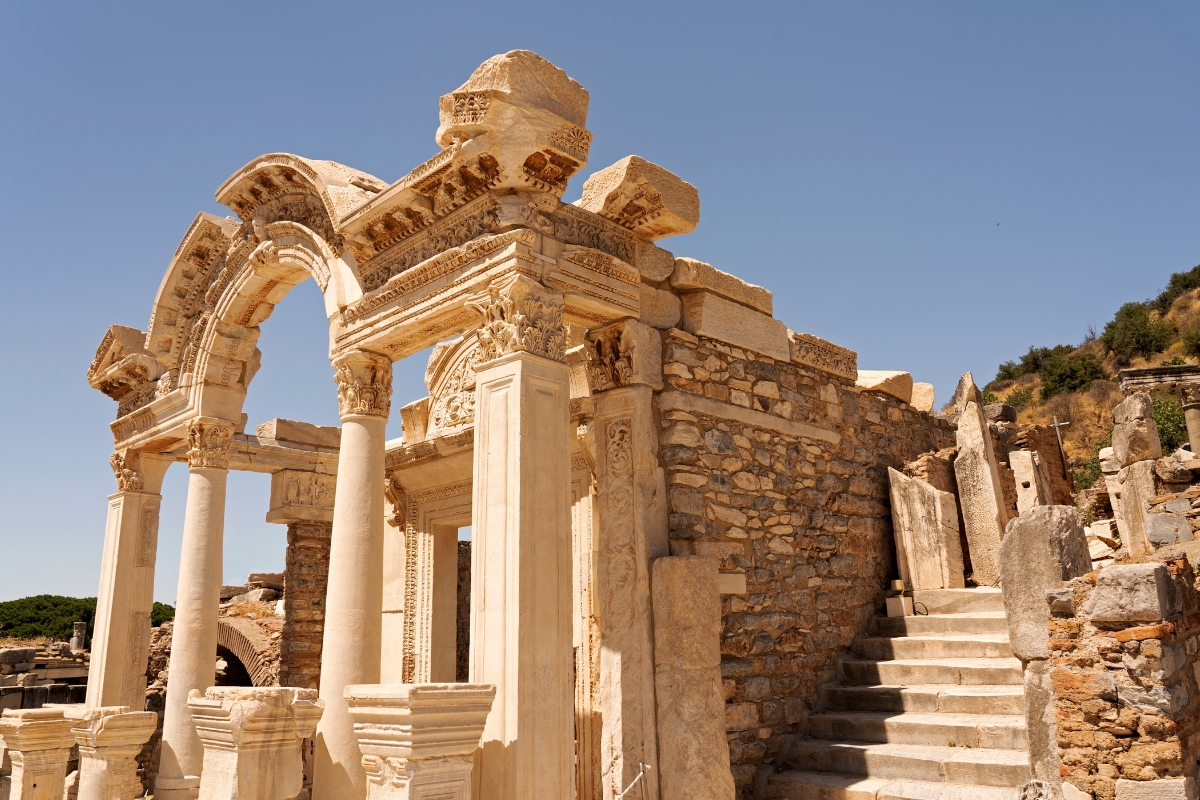
Turkey boasts a fascinating and diverse history that spans millennia. From the ancient civilizations of Anatolia to the mighty Ottoman Empire and the modern Republic of Turkey, this country has always been at the crossroads of major historical events and a melting pot of cultures.
Ancient Anatolia: Cradle of civilizations
The story of Turkey's history begins with the emergence of early human settlements in Anatolia, a region that makes up the majority of modern-day Turkey. Around 10,000 BCE, the Neolithic Revolution transformed Anatolia into one of the world's first centers of agriculture and animal domestication. Notable ancient Anatolian civilizations include the Hittites, Phrygians, and Lydians, each leaving their unique imprint on the land.
The rise of Hellenistic Anatolia
Section Type: standardWidthImageS
Trojan Horse replica at the ancient city of Troy.

Alexander the Great's conquests brought Anatolia under the influence of Hellenistic culture. Cities like Ephesus and Troy became prominent, while the region was divided among successor kingdoms after Alexander's death. Anatolia played a crucial role in the formation of the Roman Republic, serving as the base for the Roman Empire's eastern expansion.
Byzantine Anatolia
With the division of the Roman Empire into East and West, Anatolia became the heartland of the Byzantine Empire. Constantinople (modern Istanbul) emerged as the capital, a city that would later play a central role in the history of Turkey. Christianity spread throughout the region, and Byzantine art, architecture, and culture flourished.
Section Type: standardWidthImageS
This Map of Constantinople (1422) by Cristoforo Buondelmonte is the oldest surviving map of the city, and the only surviving map predating the conquest of Constantinople in 1453.

The arrival of the Seljuks
The Seljuk Turks, a Central Asian Turkic people, invaded Anatolia in the 11th century, leading to the famous Battle of Manzikert in 1071. The Seljuks' victory paved the way for the eventual Turkish dominance of the region. Anatolia became a melting pot of cultures, as Turkic, Arab, and Persian influences blended with the native Anatolian culture.
The Ottoman Empire: Rise and fall
The most iconic era in Turkey's history is undoubtedly the rise and fall of the Ottoman Empire. Founded by Osman I in the late 13th century, the Ottoman Empire rapidly expanded its territory, encompassing Anatolia, the Balkans, the Middle East, and North Africa. Constantinople was conquered in 1453 by Mehmed the Conqueror, who renamed it Istanbul.
Under the leadership of Suleiman the Magnificent in the 16th century, the Ottomans reached their zenith, controlling vast swaths of territory and leaving an indelible mark on history with achievements in art, architecture, and governance.
Section Type: standardWidthImageS
When Suleiman passed, Süleymaniye Mosque became his final resting place.

However, the empire began to decline in the 17th century, facing internal strife and external pressures from European powers. World War I was the final blow, as the Ottoman Empire sided with the Central Powers and was subsequently partitioned by the victorious Allies.
The birth of modern Turkey
Out of the ashes of the Ottoman Empire, Mustafa Kemal Atatürk emerged as a visionary leader who spearheaded the modernization and secularization of Turkey. In 1923, the Republic of Turkey was established, and Ankara became the new capital. Atatürk's reforms included the adoption of a new alphabet, the abolition of the Ottoman Caliphate, and the promotion of women's rights.
Turkey in the modern era
Turkey's modern history has been marked by a series of political, social, and economic transformations. It played a crucial role in World War II as a neutral country and joined NATO in 1952. In recent decades, Turkey has faced challenges related to its political system, human rights, and its role in the Middle East.
Section Type: standardWidthImageS
Mural in Bayramiç depicting human rights demonstration, such as consumption rights, voting rights, the right to education, freedom of thought, right to health, equality, habeas corpus, and more.

The 21st century has seen Turkey assert itself on the world stage, with a growing economy and a diverse cultural scene. However, it continues to grapple with issues such as political polarization and the Kurdish conflict.
Section Type: backgroundOnly
Know before you go
Turkey's history is a tapestry woven from the threads of countless civilizations, each leaving its own unique mark on this remarkable land. From the ancient Anatolians to the Byzantines, Seljuks, and Ottomans, the cultural mosaic of Turkey is a testament to its enduring significance in the annals of human history.
Section Type: cta
Why not experience this enchanting living museum for yourself with SA Expeditions? We have a few sample itineraries and a team of Destination Experts waiting to curate a tour that ticks all of your boxes.


Copyright © 2026 SA Luxury Expeditions LLC, All rights reserved | 8 The Green, Suite A, Dover, DE, 19901 | 415-549-8049










